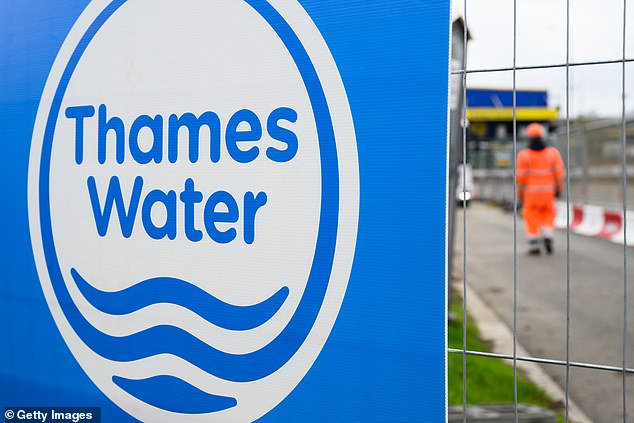The labyrinthine structure of ownership at Thames Water is something to behold.
At this stage of its life as a privatised utility, it is no longer a case of how such financial complexity was allowed to proliferate, but how best it can be dismantled.
Much of the debate at present focuses on how the holding company intends to meet a loan repayment of £190million on April 30, largely due to Chinese lenders.
The main shareholders, which include the Ontario Municipal Employees Retirement System, Abu Dhabi’s investment authority and the UK’s Universities Superannuation Scheme, effectively pronounced enough is enough. Cash will not be forthcoming unless the regulator Ofwat agrees that water bills can rise by 40 per cent over five years starting in 2025.
That is seen as the starting point for the £19billion of further upgrades required in the coming decades.

Debt ridden: Thames Water shareholders are demanding Ofwat agree that water bills can rise by 40% over five years starting in 2025
Those of us who live in London and have lived through the menace of Thames digging up our roads, disrupting traffic flows and leaving behind a thorough mess would be happy never to see another water project again.
All kinds of suggestions are being made for resolving the stalemate. If you ever wondered what investment bankers do, it is worth getting hold of the JP Morgan mapping of choices and flow charts for re-financing the enterprise. It looks like something from a Nasa rocket launch.
Some years have passed since I was invited to a breakfast meeting by a very senior Ofwat official who wanted to assure me that the days of elaborate ownership and Cayman Island tax avoidance debt structures for the water utilities were over.
Possibly the Caymans have been removed but impenetrable debt pyramids remain. Critics of the debacle suggest restoration of state ownership for the nation’s largest water supplier is the answer.
In the public sector, Thames would have to compete with the NHS and pensioners for funds.
It would face the same uncertainties as other infrastructure projects such as HS2 and risk the same kind of gross ineptitude, sheer bloody-mindedness and cover up as seen at the Post Office.
Nevertheless, a short period in ‘special administration’ could be the best solution.
The first task would be to dismantle the multi-layered ownership structure and inject transparency into what is going on.
Next would be a realistic plan to step up investment in modern pipes and pumping stations, end water wastage and the dumping of excrement into waterways.
Finally, all parties need to share the pain. Debt holders, as in any reorganisation, must take a haircut. Shareholders are there for the long term and must be prepared to stump up more equity and all 9m consumers (except for the poorest) must be prepared to pay for purer water and a cleaner environment.
Greece, after the euro crisis of 2010, hauled itself back to prosperity through enormous state and personal sacrifice in exchange for debt forgiveness. All stakeholders at Thames Water need to take a bath.
Wrong tone
Vodafone investors (including this writer) may need a merger with CK Hutchison-owned Three to boost income and earnings. But consumers certainly do not.
It was always likely, even if remedies were proposed, that the £15billion link-up would lead to a full scale probe by the Competition & Markets Authority.
The idea that the merger will drive competition and investment, as the companies claim, is gobbledegook. Fewer networks will encourage higher prices, diminish service and shrink the supply of capital.
It would also smother the challenge from lesser players such as Sky Mobile, Tesco Mobile and lesser High Street names such as Lebara.
Vodafone should think again.
Boxing clever
Independence remains the best long-term choice for all stakeholders in Britain’s packaging innovator DS Smith.
If, as seems likely, a bidding war means it will be taken over, then International Paper looks the preferable choice.
As first reported on these pages, the buyer is pledging that DS Smith will effectively become the HQ for International Paper operations in Europe.
And to reflect its importance to the UK, there will be a secondary London listing.
That sets a useful precedent.











